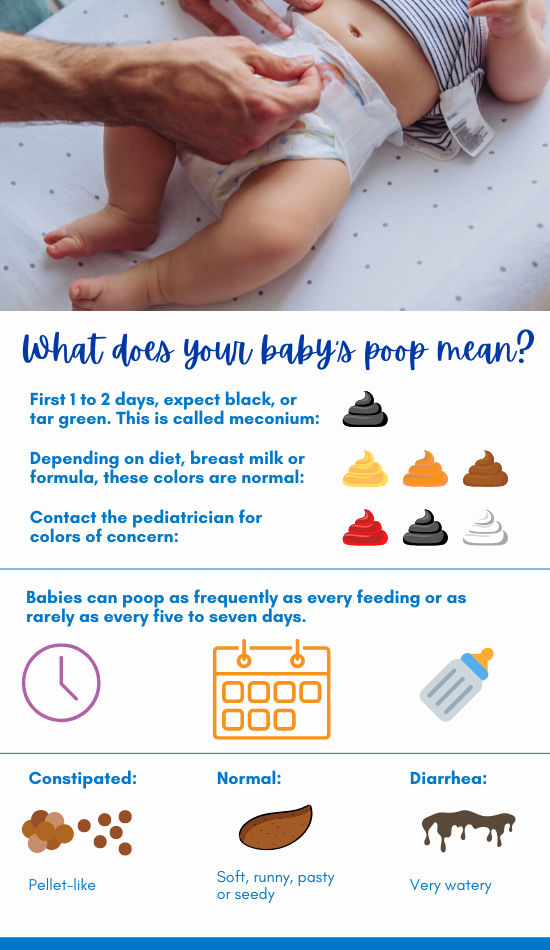What Does Your Baby's Poop Mean?

November 10, 2022
As a new parent, you’ll likely spend a lot of time examining your baby’s excrement.
We spoke to Eliana Shaul, M.D., a pediatric gastroenterologist at Hackensack University Medical Center, about what parents should pay attention to.
What Parents Should Notice About Their Baby’s Poop
Color.
The first few days after birth, your baby’s poop will look like a black or dark green tar-like substance, which doesn’t smell very much. The official name for this first poop is meconium, and once it passes through the system, your baby’s stools will begin to turn different colors, including various shades of yellow, orange and brown, depending on the makeup of your baby’s intestinal lining and how they digest milk.
“Typically, breast-fed baby poop is brighter yellow, while formula-fed poop can be a little darker yellow,” says Dr. Shaul.
A few colors may indicate an issue and warrant a call to your baby’s pediatrician. They include:
- Red stool could be due to something harmless like red foods or medicine. However, red streaks can also indicate blood, which can be a sign of allergies or other bleeding in the gastrointestinal tract.
- Black poop beyond the first week of birth can be a sign of bleeding. Sometimes, dark green poops (which are normal and can be attributed to bile, a digestive fluid produced in the liver) can appear black. Look at the poop carefully under light to determine whether it’s truly black.
- White or clay stools could indicate that your baby isn’t digesting food properly due to a liver problem.
Frequency.
Your baby should have their first meconium bowel movement within their first two days of life. “If they don’t, further evaluation for motility disorders should be performed in the newborn nursery,” says Dr. Shaul.
Once home from the hospital, a baby's pooping frequency can vary quite a bit. While every baby’s poop schedule is unique, a formula-fed baby can poop as frequently as three or four times a day or as infrequently as every two to three days. It can be normal for a breastfed baby to poop after every feeding or have only one bowel movement each week.
None of this should cause you alarm unless the baby seems uncomfortable or their abdomen swells. If the infant is going less than once a week, call your pediatrician. “Never give your infant laxatives, suppositories or other stimulators without speaking to your doctor,” Dr. Shaul says.
Consistency.
Normal – Baby poop is softer and more liquidy than older kid or adult poop. Normal textures include soft and somewhat runny, seedy and/or pasty.
Diarrhea or illness – Because baby stools are naturally soft and loose, and infants can poop after every feeding, it can be difficult to discern whether your baby has diarrhea. Very watery stools for three or more diapers can be a sign of infection or other problems that warrant a call to your pediatrician.
Constipation – At the other end of the spectrum, pellet stools can be a sign of constipation, so if you see those in your baby’s diaper, call your pediatrician.
After your baby starts eating solid foods, bowel movements may change, and you’ll see a wide range of color and consistency, depending on what the baby eats and how the digestive tract works. Call your doctor if anything changes drastically or you think your baby is uncomfortable.

Next Steps & Resources:
- Meet our source: Eliana Shaul, M.D.
- To make an appointment with Dr. Shaul or a pediatrician near you, call 800-822-8905 or visit our website.
The material provided through HealthU is intended to be used as general information only and should not replace the advice of your physician. Always consult your physician for individual care.






